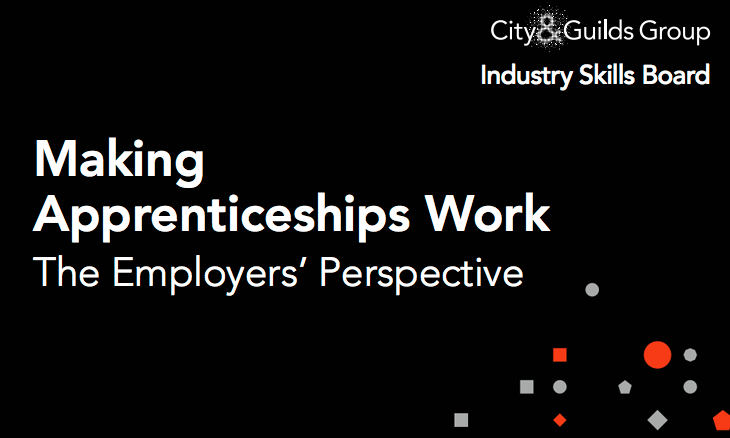 ‘Making Apprenticeships Work’, a new report from the City & Guilds Group and its Industry Skills Board (ISB)
‘Making Apprenticeships Work’, a new report from the City & Guilds Group and its Industry Skills Board (ISB)A ‘UCAS-style operation’ is needed to strengthen access to apprenticeships for teenagers, according to the UK’s leading skills organisation and senior figures from businesses including Barclays, TUI and McDonald’s.
‘Making Apprenticeships Work’, a new report from the City & Guilds Group and its Industry Skills Board (ISB), sets out key actions for politicians, business, employer groups and the education sector to take to ensure apprenticeships become as accessible and desirable as securing a place in higher education.
With the Government committed to introducing an apprenticeship levy on large firms and creating three million apprenticeship starts by 2020, the report looks at if any further reform is needed, how recent changes should be implemented, and how quality can be placed at the heart of on-the-job training.
More Recruitment Agencies are switching Membership Body to
The Institute of Recruiters – IOR
Click to see why
The report has been produced by the City & Guilds Group’s Industry Skills Board, members of which include senior figures from Microsoft, Whitbread Plc and Nationwide. The ISB membership is taken from small as well as large employers and covers many different sectors, along with representative bodies such as GTA England and the Association of Employment and Learning Providers (ALEP). It offers a 25-point action plan covering four distinct areas; putting quality at the heart of apprenticeships; employer commitment (including in the public sector); access; and leadership.
Andy Smyth, Chair of the ISB and Development Manager, Vocational Learning at TUI Group said:
“Many young people in full time education decide an apprenticeship is the right route for them – but this means nothing if they cannot access opportunities in the right timeframe. Along with the other members of the ISB, I am passionate about building a great apprenticeship system to help boost UK productivity and individual success. If the obstacles we outline in this report, such as the recruitment process, are addressed I am confident apprenticeships can become a sustainable and universally respected route to career success, serving the needs of business and young people.”
Highlighting the lack of a single coherent approach to recruitment for apprentices, the report warns that applicants aged 16-18 find it much harder to secure an apprenticeship than to enrol in a sixth form or at college or university. At the same time, employers struggle to fill their vacancies.
At present, not all apprenticeships appear as vacancies, and those that do are advertised year-round, rather than during a set application period, as UCAS requires. The authors call for a system whereby apprenticeship recruitment better relates to the school calendar and employers are incentivised to offer all apprenticeships as opportunities between July and October, enabling more young people to see and apply for them. These opportunities will then be converted into vacancies later in the year to suit employers’ individual recruitment strategies – creating a system that works for both businesses and young people.
The report notes that ‘society has essentially misled young people’ to assume that higher education is the best route to all careers, and makes a number of recommendations on enhancing access to apprenticeships. These include ensuring that careers advice provides clarity about the implications of graduate versus non-graduate employment and of specific degree courses, and for the Government to include occupation in destination outcomes from apprenticeships. It also urges colleges to help young people move directly from vocational courses to employer-based training after completion, with the City & Guilds Group pledging to ensure its vocational courses are devised to facilitate progression on to an apprenticeship.
The report also calls for the creation of an employer-led governing body for apprenticeships, functioning separately from Government. The authors state this group should have oversight of policy decisions including expenditure of the proposed apprenticeship levy.
Kirstie Donnelly MBE, Managing Director, City & Guilds, said:
“This report makes a vital contribution to the discussion around how apprenticeships should be designed to best suit apprentices and business. Crucially, the action plans have been composed by those best placed to understand how the system should work – employers themselves. I sat on the cross-party apprenticeship commission earlier this year and the focus on a UCAS-style operation was one of the outputs from that session. It’s clear that the time to make changes is now and I welcome the ISB members’ commitment to apprenticeships and cannot thank them enough for their dedication to making sure future provision is sustainable.”
Other key findings and recommendations include:
- The Department for Business, Innovation and Skills should hold to its policy on a single apprenticeship for each occupation
- Employer groups and providers should offer and promote different mixes of training and learning methods to enhance employer choice and allow employers to take on more or less of the training and learning.
- All apprentices should embark on continuing training and development after completion
- Success rates should be calculated based on achievement of end assessment measured against entries for assessment, with early leavers monitored separately.
- Apprenticeships should be fully integrated as a normal entry route into public sector jobs.
- The apprenticeship levy should be based on a virtual account (similar to a bank account) and it should be made easier for larger numbers of employers to opt for direct funding.
Dominic Gill, Apprenticeship Lead, Microsoft UK added:
“There is no question that if British businesses want to be guaranteed of the skilled employees of the future, we need to play our part in making sure the system works. Apprenticeships are at the heart of this, so it is paramount that we address obstacles to recruitment and quality. It is high time that securing a place on a high-quality apprenticeship becomes as straightforward as securing a place on a higher education course.”
Get The Recruiting Times FREE every Monday – SUBSCRIBE NOW
Recruiters love this COMPLETE set of Accredited Recruitment & HR Training – View Training Brochure







